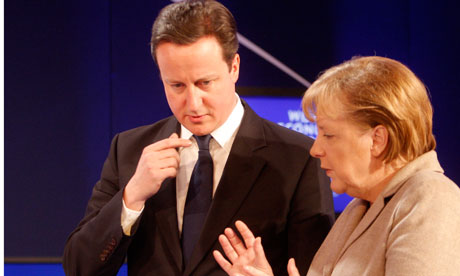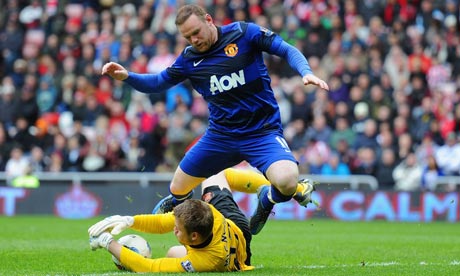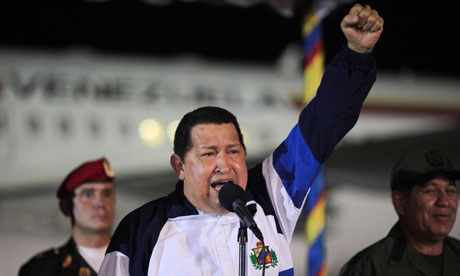Easy to blame the Germans. Smarter to learn from them
Other leaders are being hypocritical when they shove all the responsibility for the euro crisis on to Angela Merkel

Chancellor Angela Merkel with David Cameron. Photograph: Michel Euler/AP
As Noël Coward didn't quite sing, do let's be beastly to the Germans.
This bitter tune is heard not just in Greece, but also in the corridors
of Number 10, the Elysée Palace and the White House. Casting around for
someone to blame for the crisis, the fingers of accusation point at Germany and its chancellor, Angela Merkel.
The jabbing fingers are furiously angry ones on the streets of Athens where German flags are burnt and the newspapers dress Ms Merkel in Nazi uniform. The jabbing continues in editorials in the American press, which charges Berlin with being single-handedly responsible for taking the world economy to the brink of the abyss. The jabbing is dressed in the language of diplomacy at this weekend's G8 summit where Barack Obama, François Hollande and David Cameron have ganged up on the German chancellor.
The American Democrat, British Conservative and French Socialist may not agree on much else, but on this, at least, they are together. It is one second to midnight in the eurozone because a recalcitrant and miserly Germany has refused to step up to its historic responsibility to do what is necessary to save the single currency. If the eurozone implodes, and carries away the global economy with it, the buck will stop in Berlin.
Let us begin by acknowledging that Germany does deserve a big helping of blame for the very scary state of the eurozone. Berlin shares, principally with Paris, responsibility for the original sin. That was to construct a badly designed and over-stretched single currency area containing contradictions that would explode under stress. In the pursuit of a European ideal, Germany forgot its usual prudence when Berlin nodded and winked at the admission of countries – Greece being the most extreme example – for whom euro membership was not only inappropriate but very dangerous.
It is fair enough also to observe that Germany has repeatedly failed to offer leadership that rises to the scale of the present crisis. When Germany has led, it has not always been in a well-judged direction. The austerity programme imposed on the Greeks as the price for continued membership of the euro was too draconian to be implemented in a democracy. The voters would surely revolt and they duly have.
The European Central Bank has been denied the necessary firepower to get ahead of events because the Germans wouldn't allow it. Ms Merkel has never been a very easy partner for her peer group. One of Gordon Brown's officials who had a ringside seat during the negotiations at the London G20 describes her thus: "Incredibly stubborn. Immovable. She simply digs in." One of David Cameron's team says dealing with the German chancellor is "like trying to squeeze blood from the proverbial stone".
I expect she will concede just enough to the growth agenda being pushed by other G8 leaders for them to cobble together an end-of-summit communiqué that pretends they are all agreed. There will be a further attempt to reconcile the German insistence on fiscal discipline with the French call for measures to promote growth when the EU heads of government meet in Brussels on Wednesday. One proposal would see the European Investment Bank receive an additional €10bn in funding. The leaders are also likely to back a European Commission plan to issue "project bonds" – debt backed by all 17 eurozone countries to raise funds for infrastructure programmes in depressed regions. All of which will give them something to justify meeting and none of which is anything like sufficient to ease an immediate crisis of such magnitude that €10bn is peanuts.
Germany must take her portion of the blame for the calamities in the eurozone and the cataclysm that now threatens to unfold. But the more I hear people being beastly about the Germans, the more I see all the responsibility being shoved in their direction, the more my sympathies begin to lean towards Angela Merkel's dilemmas and her people's concerns. When Barack Obama calls for "decisive action" to save the eurozone, Germans hear him saying that they should write yet more large cheques to bail it out. When François Hollande demands a growth package, Germans ask who but they will pay for it when everyone else in Europe is broke. When David Cameron tells the eurozone to "put its house in order", Germans perceive a peremptory request for them to throw more good money after bad. Germany will probably end up picking up most of the bill for this disaster, but you can see why they are tired of being told to do so.
The demand has to be particularly galling when it comes from David Cameron, the prime minister of a country that is not a member of the euro and who leads a party that wills it to fail. Angela Merkel is entitled to feel that being told to relax on fiscal discipline is particularly cheeky – a kinder word than hypocritical – coming from Mr Cameron. In speeches to home audiences, the prime minister insists that he must defy "dangerous voices calling on us to retreat" and stick with his government's austerity programme on the grounds that: "You can't borrow your way out of a debt crisis." Yet when lecturing the Germans, Mr Cameron recommends that they should turn on the spending taps to get the eurozone out of its debt crisis.
His aides say that the prime minister wants to make common cause with Monsieur Hollande in pressing Chancellor Merkel for a more growth-orientated strategy in Europe. That would be the same Monsieur Hollande whom the prime minister would not deign to meet before he was elected to the Elysée, the same Monsieur Hollande who was badmouthed by Tories as a crazy leftie who would lead his country to ruin – Ed Balls in a beret.
The reason why Germany has found herself in this isolated position boils down to this: she has money and everyone else does not. Her economy is growing, her unemployment rate is much lower and her debts are under control. She is a rich country among paupers because Germany has been much better governed than her peer group. Some reckless German financiers laid stupid bets, but her banks were not allowed to hazard the rest of the economy in quite such a shocking way as banks were in Britain and America.
Germany took care of her finances much more prudently than her European neighbours. She has a welfare state, public services and infrastructure that provoke jealousy in any visitor from Britain. But she did not make the mistake of trying to buy them on the never-never. Germany did not build up the mountains of debt, both private and public, which bear down on Britain and others. As a result, German households and firms can borrow without being punished by the bond market vigilantes.
It is true that the Germans have had a fantastic deal out of the euro; a much better one than either they or anyone else anticipated when they thought they were sacrificing their beloved deutchsmark in the cause of European unity. The theory at the time was that the euro would help the less impressive economies to catch up and create, in Helmut Kohl's phrase, "a strong Germany in a strong Europe".
The actual result has turned out to be a strong Germany in a weak Europe. The euro has certainly boosted their exports-driven economy, which is one reason why Germans should be very fearful of its implosion. But it was not the euro that made them a great exporting nation in the first place. They were extremely accomplished at selling things when they were priced in the powerful deutchsmark because postwar Germany has been brilliant at manufacturing goods that others want to buy.
It was announced last week that Vauxhall will be building its new model of Astra at Ellesmere Port in Cheshire rather than in a German factory. This news was regarded as so remarkable that two cabinet ministers were sent north to mark it. While Vince Cable paid a celebratory visit to the plant, David Cameron made a speech in Manchester applauding a renaissance in the car industry. It is very good news for British manufacturing – so long as you don't linger too long over the caveat that Vauxhall is owned by General Motors of America. But such a fuss over one announcement draws attention to the rarity of Britain beating Germany at car-making since 1945.
The usual mode of British politicians is to be envious of what Germany has achieved. Ed Miliband commends the German model of industrial relations, in which workers are represented on company boards, as a restraint on the corporate excesses we have seen in Britain. With its record of investment in high-value industries and emphasis on making quality goods that the world wants to own, German strength is based on the solid prosperity that coalition ministers aspire to create when they talk about "rebalancing" the British economy.
Germany has its flaws. Angela Merkel has made her fair share of mistakes. But this is no time for contempt, especially not from Britain, for a country that is enviably competitive, rich, stable, free and socially and environmentally progressive. If there is a long-term solution to the miseries of the rest of Europe, it doesn't lie in being beastly to the Germans. It would be a better idea to try to learn from them.
The jabbing fingers are furiously angry ones on the streets of Athens where German flags are burnt and the newspapers dress Ms Merkel in Nazi uniform. The jabbing continues in editorials in the American press, which charges Berlin with being single-handedly responsible for taking the world economy to the brink of the abyss. The jabbing is dressed in the language of diplomacy at this weekend's G8 summit where Barack Obama, François Hollande and David Cameron have ganged up on the German chancellor.
The American Democrat, British Conservative and French Socialist may not agree on much else, but on this, at least, they are together. It is one second to midnight in the eurozone because a recalcitrant and miserly Germany has refused to step up to its historic responsibility to do what is necessary to save the single currency. If the eurozone implodes, and carries away the global economy with it, the buck will stop in Berlin.
Let us begin by acknowledging that Germany does deserve a big helping of blame for the very scary state of the eurozone. Berlin shares, principally with Paris, responsibility for the original sin. That was to construct a badly designed and over-stretched single currency area containing contradictions that would explode under stress. In the pursuit of a European ideal, Germany forgot its usual prudence when Berlin nodded and winked at the admission of countries – Greece being the most extreme example – for whom euro membership was not only inappropriate but very dangerous.
It is fair enough also to observe that Germany has repeatedly failed to offer leadership that rises to the scale of the present crisis. When Germany has led, it has not always been in a well-judged direction. The austerity programme imposed on the Greeks as the price for continued membership of the euro was too draconian to be implemented in a democracy. The voters would surely revolt and they duly have.
The European Central Bank has been denied the necessary firepower to get ahead of events because the Germans wouldn't allow it. Ms Merkel has never been a very easy partner for her peer group. One of Gordon Brown's officials who had a ringside seat during the negotiations at the London G20 describes her thus: "Incredibly stubborn. Immovable. She simply digs in." One of David Cameron's team says dealing with the German chancellor is "like trying to squeeze blood from the proverbial stone".
I expect she will concede just enough to the growth agenda being pushed by other G8 leaders for them to cobble together an end-of-summit communiqué that pretends they are all agreed. There will be a further attempt to reconcile the German insistence on fiscal discipline with the French call for measures to promote growth when the EU heads of government meet in Brussels on Wednesday. One proposal would see the European Investment Bank receive an additional €10bn in funding. The leaders are also likely to back a European Commission plan to issue "project bonds" – debt backed by all 17 eurozone countries to raise funds for infrastructure programmes in depressed regions. All of which will give them something to justify meeting and none of which is anything like sufficient to ease an immediate crisis of such magnitude that €10bn is peanuts.
Germany must take her portion of the blame for the calamities in the eurozone and the cataclysm that now threatens to unfold. But the more I hear people being beastly about the Germans, the more I see all the responsibility being shoved in their direction, the more my sympathies begin to lean towards Angela Merkel's dilemmas and her people's concerns. When Barack Obama calls for "decisive action" to save the eurozone, Germans hear him saying that they should write yet more large cheques to bail it out. When François Hollande demands a growth package, Germans ask who but they will pay for it when everyone else in Europe is broke. When David Cameron tells the eurozone to "put its house in order", Germans perceive a peremptory request for them to throw more good money after bad. Germany will probably end up picking up most of the bill for this disaster, but you can see why they are tired of being told to do so.
The demand has to be particularly galling when it comes from David Cameron, the prime minister of a country that is not a member of the euro and who leads a party that wills it to fail. Angela Merkel is entitled to feel that being told to relax on fiscal discipline is particularly cheeky – a kinder word than hypocritical – coming from Mr Cameron. In speeches to home audiences, the prime minister insists that he must defy "dangerous voices calling on us to retreat" and stick with his government's austerity programme on the grounds that: "You can't borrow your way out of a debt crisis." Yet when lecturing the Germans, Mr Cameron recommends that they should turn on the spending taps to get the eurozone out of its debt crisis.
His aides say that the prime minister wants to make common cause with Monsieur Hollande in pressing Chancellor Merkel for a more growth-orientated strategy in Europe. That would be the same Monsieur Hollande whom the prime minister would not deign to meet before he was elected to the Elysée, the same Monsieur Hollande who was badmouthed by Tories as a crazy leftie who would lead his country to ruin – Ed Balls in a beret.
The reason why Germany has found herself in this isolated position boils down to this: she has money and everyone else does not. Her economy is growing, her unemployment rate is much lower and her debts are under control. She is a rich country among paupers because Germany has been much better governed than her peer group. Some reckless German financiers laid stupid bets, but her banks were not allowed to hazard the rest of the economy in quite such a shocking way as banks were in Britain and America.
Germany took care of her finances much more prudently than her European neighbours. She has a welfare state, public services and infrastructure that provoke jealousy in any visitor from Britain. But she did not make the mistake of trying to buy them on the never-never. Germany did not build up the mountains of debt, both private and public, which bear down on Britain and others. As a result, German households and firms can borrow without being punished by the bond market vigilantes.
It is true that the Germans have had a fantastic deal out of the euro; a much better one than either they or anyone else anticipated when they thought they were sacrificing their beloved deutchsmark in the cause of European unity. The theory at the time was that the euro would help the less impressive economies to catch up and create, in Helmut Kohl's phrase, "a strong Germany in a strong Europe".
The actual result has turned out to be a strong Germany in a weak Europe. The euro has certainly boosted their exports-driven economy, which is one reason why Germans should be very fearful of its implosion. But it was not the euro that made them a great exporting nation in the first place. They were extremely accomplished at selling things when they were priced in the powerful deutchsmark because postwar Germany has been brilliant at manufacturing goods that others want to buy.
It was announced last week that Vauxhall will be building its new model of Astra at Ellesmere Port in Cheshire rather than in a German factory. This news was regarded as so remarkable that two cabinet ministers were sent north to mark it. While Vince Cable paid a celebratory visit to the plant, David Cameron made a speech in Manchester applauding a renaissance in the car industry. It is very good news for British manufacturing – so long as you don't linger too long over the caveat that Vauxhall is owned by General Motors of America. But such a fuss over one announcement draws attention to the rarity of Britain beating Germany at car-making since 1945.
The usual mode of British politicians is to be envious of what Germany has achieved. Ed Miliband commends the German model of industrial relations, in which workers are represented on company boards, as a restraint on the corporate excesses we have seen in Britain. With its record of investment in high-value industries and emphasis on making quality goods that the world wants to own, German strength is based on the solid prosperity that coalition ministers aspire to create when they talk about "rebalancing" the British economy.
Germany has its flaws. Angela Merkel has made her fair share of mistakes. But this is no time for contempt, especially not from Britain, for a country that is enviably competitive, rich, stable, free and socially and environmentally progressive. If there is a long-term solution to the miseries of the rest of Europe, it doesn't lie in being beastly to the Germans. It would be a better idea to try to learn from them.



